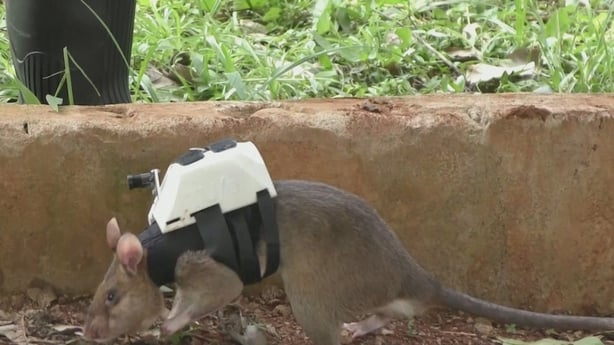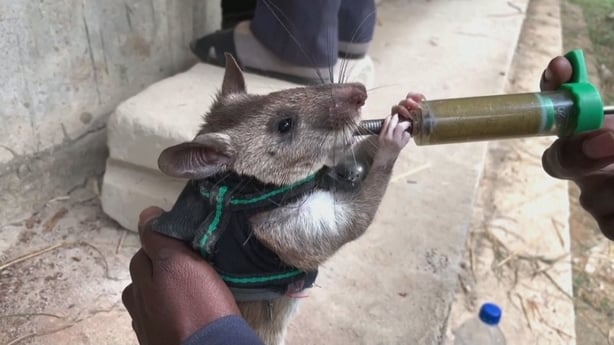Giant rats wearing tiny high-tech backpacks are being trained in Tanzania for search and rescue operations.
Belgium-based non-profit company APOPO has already trained rats and dogs to detect landmines as well as sniffing out outbreaks of tuberculosis, but because of their size and agility, rats could also be a valuable tool for existing search and rescue efforts.
"Rats are just as trainable as dogs and they've got great sense of smell and they're small size and natural agility should hopefully make them really good in this scenario where they could squeeze in small spaces and get closer to any victims," lead researcher Dr Donna Kean said.
However the rats being trained are not the usual rodents that most people associate with rubbish and disease - these are African Giant Pouched Rats, that can weigh up to around 1.5 kilogrammes
Not only are these rats very biddable, meaning they can be trained much like a dog, but they also have a longer lifespan than other rats.
"Our rats can live up to eight to ten years in captivity, which means that even after the training, which can take nine months to a year, they still have quite a long working career ahead of them," Dr Kean said.

Training of the rescue rats began in August 2021 at APOPO's Training and Research Center, hosted by the Sokoine University of Agriculture (SUA) in Morogoro, Tanzania.
The rats were trained to locate humans in a mock disaster zone, such as after an earthquake, and will eventually be outfitted with a technology-enabled backpack to enable wireless audio-visual communication from within the disaster site.
They are also being trained to pull a microswitch around their necks when a victim has been located.
"The rat pulls the handle that's hanging around at its neck and can remotely let us know when they've found potential victim," Dr Kean added.

In testing, the rats were able to learn the basic behavioural sequence within a limited search space: search for and move into proximity of a "trapped victim", trigger the microswitch by pulling the ball attached to their vest to remotely communicate to their handler when the victim has been found, and return to their release point to receive food when the handler activates a beeper signal.
Dr Kean said they are now increasing the complexity of the environment to more closely mimic real disaster sites.
A multifunctional backpack is being designed by a team of engineers at Eindhoven University of Technology, which will include a video camera, microphone and speaker for two-way communication, and a device for tracking where the rat is located.
Once rats are proficient, Dr Kean said, they plan move them to Turkey for additional training trials with a Turkish search and rescue group.
If successful, they could be moved to operational trials in which the rats could be mobilised in response to any natural disaster.
Giant rats wearing tiny high-tech backpacks are being trained in Tanzania for search and rescue operations | Read more: https://t.co/jSRpxDE0Uv pic.twitter.com/WZb4VGjNRY
— RTÉ News (@rtenews) November 10, 2022

